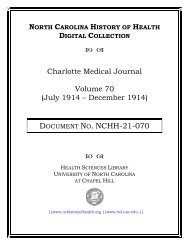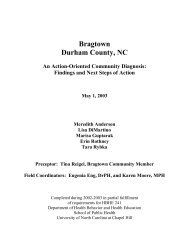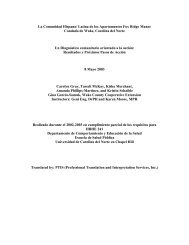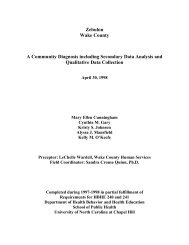The Health bulletin [serial] - University of North Carolina at Chapel Hill
The Health bulletin [serial] - University of North Carolina at Chapel Hill
The Health bulletin [serial] - University of North Carolina at Chapel Hill
Create successful ePaper yourself
Turn your PDF publications into a flip-book with our unique Google optimized e-Paper software.
20 <strong>The</strong> <strong>Health</strong> Bulletin December, 1927<br />
Ry D. E.<br />
SCABIES<br />
FORD, M.D.<br />
<strong>The</strong>re is an affliction—it miglit be<br />
called a disease—which is <strong>of</strong>ten very<br />
annoyinj;: to our scliools. It is commonly<br />
called the Itch, but is medically<br />
known as Scabies. It appears in nearly<br />
every school <strong>at</strong> some time durin.i: the<br />
year ; and it is only by constant vigilance<br />
on the part <strong>of</strong> those in charge<br />
th<strong>at</strong> prevents its spread.<br />
It is caused by a little bug. This<br />
little animal is just big enough to be<br />
seen with the naked eye. It would<br />
look like a minute black speck if put<br />
on a piece <strong>of</strong> white paper.<br />
<strong>The</strong> female <strong>of</strong> this little animal<br />
(whose real name is Acarus Scabiei),<br />
burrows into the skin usually where it<br />
is tenderest—such as between the<br />
fingers, but spreads nearly all over.<br />
When she gets well dug in she lays<br />
her eggs.<br />
<strong>The</strong> eggs h<strong>at</strong>ch in about two days<br />
and the young ones make their way<br />
out, grow up, and the next gener<strong>at</strong>ion<br />
<strong>of</strong> wives digs in to lay eggs.<br />
This causes intense itching, and the<br />
victims scr<strong>at</strong>ch. <strong>The</strong>y keep on scr<strong>at</strong>ching<br />
and digging. <strong>The</strong> scr<strong>at</strong>ched places<br />
scab over or get infected with "blood<br />
poison" and form pusy sores. <strong>The</strong>n the<br />
poison from these sores is spread about<br />
by the scr<strong>at</strong>ching.<br />
<strong>The</strong> little animals get into the sheets<br />
and blankets and underclothing and<br />
make life miserable for the whole<br />
family.<br />
Each teacher is on the w<strong>at</strong>ch for<br />
this—for the first case in his school.<br />
Suspicious cases are reported to the<br />
health department. <strong>The</strong> children are<br />
sent froTi school and kept out till<br />
cured. This isn't always ( asy. Sometimes<br />
several in a family sc<strong>at</strong>tered<br />
through several school rooms will have<br />
it. the baby and mother and f<strong>at</strong>her <strong>at</strong><br />
home will have it.<br />
A child is sent home, tre<strong>at</strong>ed and<br />
comes back cured—then he gets another<br />
b<strong>at</strong>ch <strong>of</strong> bugs from the untre<strong>at</strong>ed<br />
home foils.<br />
<strong>The</strong> tre<strong>at</strong>ment isn't difficult, but is<br />
troublesome and must be thorough to<br />
really cure. <strong>The</strong> important parts <strong>of</strong> the<br />
medicine are sulphur in an eily substance.<br />
This must be rubbed into the<br />
skin. No medicine by mouth is <strong>of</strong> any<br />
use.<br />
<strong>The</strong> best salve is Danish Ointment<br />
wh'ch all drug stores se'.l. Take a hot<br />
b<strong>at</strong>h, dry thoroughly and then rub this<br />
ointment into the skin all over. Go to<br />
bed in clean night clothing and bed<br />
clothing and next morning take another<br />
hot b<strong>at</strong>h. Put on clean clothes.<br />
All underclothes and sheets must be<br />
boiled to clean them. Repe<strong>at</strong> the tre<strong>at</strong>ment<br />
in t\^o or three days.<br />
This doesn't cure the scr<strong>at</strong>ches and<br />
sores which must be tre<strong>at</strong>ed the same<br />
as sores from any other cause.<br />
A careful mother can rid her children<br />
<strong>of</strong> the Scabies easily. It's not<br />
this kind th<strong>at</strong> annoy our schools. It<br />
is the fami.y th<strong>at</strong> doesn't care and<br />
won t take the trouble to keep their<br />
children clean th<strong>at</strong> keeps the school<br />
upset.—jVe«' Bern Times.<br />
"SCIENCE AND PUBLIC HEALTH'<br />
Last October the American Public<br />
<strong>Health</strong> Associ<strong>at</strong>ion met in Cincinn<strong>at</strong>i,<br />
Ohio, whei-e in 1873 the first scientitic<br />
meeting <strong>of</strong> th<strong>at</strong> associ<strong>at</strong>ion was held.<br />
<strong>The</strong> president this year was Dr. Charles<br />
V. Chapin, who has been Superintendent<br />
<strong>of</strong> <strong>Health</strong> <strong>of</strong> the city <strong>of</strong> Providence,<br />
Rhode Island, for more than<br />
forty years. Dr. Chapin is one <strong>of</strong> the<br />
most distinguished heaith <strong>of</strong>ficers in the<br />
United St<strong>at</strong>es. <strong>The</strong> above title, which<br />
was the subject <strong>of</strong> Dr. Chapin's Presidential<br />
Address, was a discussion <strong>of</strong><br />
the progress preventive medicine has<br />
made since this tirst scientific meeting<br />
<strong>of</strong> th<strong>at</strong> associ<strong>at</strong>ion in 1873. We are<br />
herewith publishing the following extracts<br />
from th<strong>at</strong> address which we are<br />
sure will be <strong>of</strong> very gre<strong>at</strong> interest to<br />
our readers.<br />
Science Is<br />
Progressive<br />
"Science can never be a closed book.<br />
It is like a tree, ever growing, ever


![The Health bulletin [serial] - University of North Carolina at Chapel Hill](https://img.yumpu.com/33495252/378/500x640/the-health-bulletin-serial-university-of-north-carolina-at-chapel-hill.jpg)




![Bulletin of the North Carolina Board of Health [serial] - University of ...](https://img.yumpu.com/48032016/1/153x260/bulletin-of-the-north-carolina-board-of-health-serial-university-of-.jpg?quality=85)
![The Health bulletin [serial] - University of North Carolina at Chapel Hill](https://img.yumpu.com/47603625/1/169x260/the-health-bulletin-serial-university-of-north-carolina-at-chapel-hill.jpg?quality=85)
![The Health bulletin [serial] - University of North Carolina at Chapel Hill](https://img.yumpu.com/47242858/1/169x260/the-health-bulletin-serial-university-of-north-carolina-at-chapel-hill.jpg?quality=85)
![The Health bulletin [serial] - University of North Carolina at Chapel Hill](https://img.yumpu.com/43204263/1/172x260/the-health-bulletin-serial-university-of-north-carolina-at-chapel-hill.jpg?quality=85)
![The Health bulletin [serial] - University of North Carolina at Chapel Hill](https://img.yumpu.com/41981074/1/163x260/the-health-bulletin-serial-university-of-north-carolina-at-chapel-hill.jpg?quality=85)

![The Health bulletin [serial] - University of North Carolina at Chapel Hill](https://img.yumpu.com/40912928/1/164x260/the-health-bulletin-serial-university-of-north-carolina-at-chapel-hill.jpg?quality=85)

![The Health bulletin [serial] - University of North Carolina at Chapel Hill](https://img.yumpu.com/35643061/1/167x260/the-health-bulletin-serial-university-of-north-carolina-at-chapel-hill.jpg?quality=85)
![Biennial report of the North Carolina State Board of Health [serial]](https://img.yumpu.com/34024350/1/166x260/biennial-report-of-the-north-carolina-state-board-of-health-serial.jpg?quality=85)
